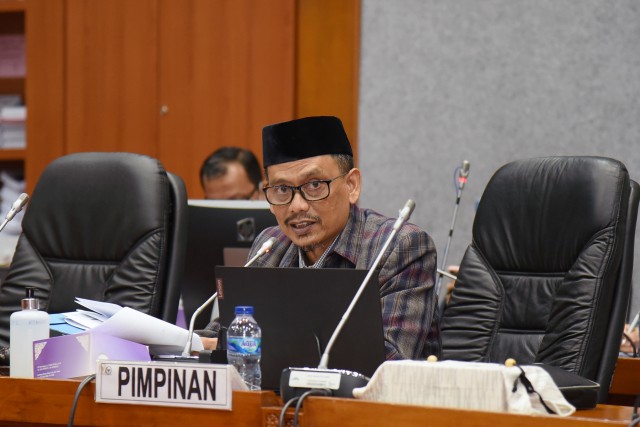MOEC Indicative Ceiling Set at Rp75 Trillion
House Commission X Deputy Chair Abdul Fikri Faqih speaks at a working meeting between House Commission X and Education and Culture Minister Nadim Makariem at the Parliamentary Building in Jakarta on Thursday (3/9/2020). Photo: Arief/Man
The indicative ceiling for Ministry of Education and Culture in the 2021 Daft State Budget (RAPBN) is set at more than Rp75 trillion. The budget will be distributed to finance a large number of programs, such as Smart Indonesia Program (PIP), professional allowances for civil servant teachers and non-civil servant teachers, and scholarships.
The budget was drawn up at a working meeting between House Commission X—overseeing education affairs—and Education and Culture Minister Nadim Makariem at the Parliamentary Building in Jakarta on Thursday (3/9/2020). Many development targets in education sectors have to be met in 2021 according to the 2021 RAPBN considerations, said House Commission X Deputy Chair, Abdul Fikri Faqih, who presided over the meeting.
The Prosperous Justice Party (PKS) politician explained that the MOEC development target output includes the Smart Indonesia cash assistance program for 17,927,992 students, the higher education scholarship program for 1,095,000 students from low income families (Bidiki Misi), professional allowance for 224,625 non civil servant teachers, allowance for 67,320 non-civil servant teachers, special allowance for 21,628 teachers, and many others.
“The ministry’s indicative budget ceiling for the 2021 fiscal year is set at Rp75,094,499,625,000. This figure is Rp6 trillion less than what the President mentioned in the presentation of the 2021 State Budget Bill and its Financial Note on August 14, which was Rp81,534.1 trillion,” Faqih stated. He continued by saying that development in the education sector, according to the 2021 State Budget Bill, will focus on manpower development, technological adaptability, and improved productivity through knowledge-based economy.
Faqih concluded that in regard to Industry 4.0, our education policies have been directed towards, among others, transformation of school principal leadership and teacher’s training course, tailoring instruction to students’ learning level, and application of global assessment standard. In addition, in light of Industry 4.0, the education sector should also be prepared to build partnership between local governments and civil society. (mh/sf)

